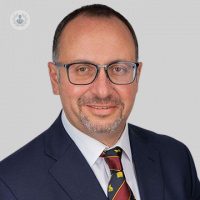Gamma Knife radiosurgery: The advantages of radiation treatment for brain conditions
Written in association with:Gamma Knife radiosurgery is a highly specialised, non-invasive treatment that treats lesions in the brain, preserving the majority of healthy brain tissue. Here to provide an expert insight into Gamma Knife radiosurgery is Mr Ramez Ibrahim, renowned consultant neurosurgeon at Thornbury Radiosurgery Centre.

How is Gamma Knife radiosurgery performed?
Gamma Knife, contrary to what people might believe, is not an actual surgery. In fact, it is a radiation treatment that employs a very highly focused beam of radiation. Due to its precision, it is hence called knife, but there is no incision. Gamma knife radiosurgery can be delivered in one or more treatment sessions, but in most cases, it is a one-off, single treatment.
Gamma Knife therapy and treatment are both carried out using a specific machine device, after having acquired targeted imaging of the brain and the lesion. Treatment time can be varied, depending on the condition that is being treated.
Why and when would it typically be used?
Gamma Knife treatment has now become one of the primary treatment options for many neurosurgical indications, including benign tumours such as vestibular schwannomas, other tumours like malignant tumours, and some vascular conditions of the brain like arteriovenous malformations. It is also indicated for certain pain conditions like trigeminal neuralgia.
How safe is it? What are the main potential risks and complications?
Gamma Knife treatment compared to other treatment options - most notably surgery - is considered relatively safe. This is because Gamma Knife is multidisciplinary; it is a team effort to deliver the treatment and it is backed by quality assurance and quality checks throughout all the patient treatment.
There can be some risks, but these are kept to a minimal and they can be variable. Again, the risks are considered to be very small compared to surgical treatment.

What does it treat or cure exactly?
Gamma Knife radiosurgery is employed for the treatment of a variety of neurosurgical conditions, including benign and malignant tumours, specific vascular conditions of the brain like arteriovenous malformations, and also certain pain conditions of the brain like trigeminal neuralgia.
These, by far, represent the majority of the indications for Gamma Knife. They are conditions that used to be primarily treated with surgery before, but Gamma Knife treatment has proven itself to be a safer and a less invasive treatment option for all patients.
How effective and safe is this procedure?
Gamma Knife treatment is very effective at controlling tumour growth in the majority of the tumours, including benign and malignant tumours.
The safety profile of Gamma Knife has been tested thoroughly, and despite some risks of complications, it is regarded as the least invasive form of treatment. One of the risks is associated oedema (swelling) in the area next to the target that is being treated, but this risk can be mitigated with certain medication, like steroids, if it does occur, usually for a short period.
Some patients who, for instance, may have epilepsy or seizures, with successful treatment, there have been reports that Gamma Knife would actually reduce the risk of epilepsy and further seizures, and possibly manage to reduce their medication as well.
Mr Ramez Ibrahim is a highly qualified consultant neurosurgeon who specialises in Gamma Knife radiosurgery and the treatment of neurological conditions and blood vessel malformations.
If you are considering Gamma Knife and wish to know more, do not hesitate to visit Mr Ibrahim’s Top Doctors profile today.


